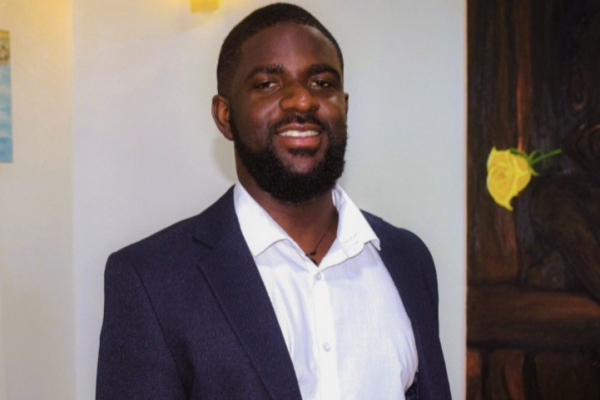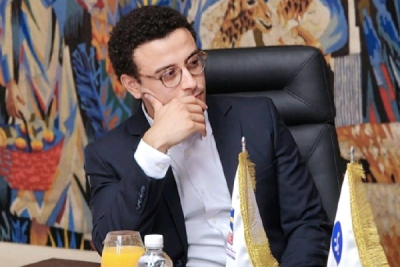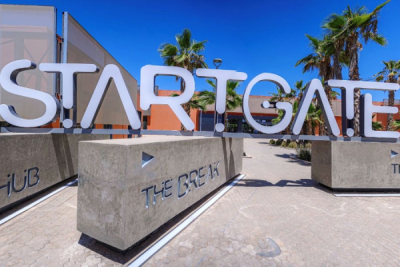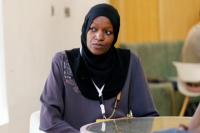
TECH STARS (1007)
The e-commerce industry is experiencing remarkable growth in Africa. In Ghana, Felix Manford allows aspiring entrepreneurs to join this sector without the need for any initial capital investment.
Felix Manford (photo) is a Ghanaian entrepreneur and business leader with an impressive academic and professional background. He is the co-founder and CEO of Tendo, a startup that connects suppliers with Ghanaian drop shippers.
He graduated from the University of Ghana in 2018 with a Bachelor of Business Administration. In 2020, he founded Tendo to enable Africans to enter the e-commerce sector even without startup capital.
Tendo connects local wholesalers with independent retailers who can then select products they want to sell online, add their mark-up margins, advertise the products on social media, and earn money every time a purchase is made.
Before Tendo, “people who want to sell online [had] to save money, visit hundreds of suppliers to find a trusted one, and risk losing their capital by stocking up inventory. [They also had] to incur costs for logistics and warehousing. We eliminate all that,” said Felix Manford in 2022.
The startup, which is currently operational in Nigeria and Ghana, underwent the acceleration program of MEST Africa, in 2020. In 2021, it participated in Google's Black Founders Fund program. The following year, it also took part in Y Combinator’s winter program before being named (in 2023), by Make Money Media, as one of the 10 most successful African startups.
During his studies, Felix Manford worked in 2016 at UK Trade & Investment as a sales assistant in Ghana. In 2017, he was hired as a marketing and research officer at Global Trade Consult.
After graduating in 2018, he completed a one-month internship in global investment research at Goldman Sachs before being hired by the company in its Global Investment Research department.
Melchior Koba
Africa is a continent with immense potential for innovation and entrepreneurship, but it also faces many challenges. DFC Technology Hub is doing its part to address some of those challenges and foster a dynamic technology ecosystem.
DFC Technology Hub (DTH) was founded in 2021 by Felix Achibiri. It is a technology accelerator, startup incubator, and venture capital firm with a strategic initiative to accelerate the pace of technological development in Africa.
DTH works closely with founders and innovators to create technology solutions that will shape Africa's future, particularly in the fields of fintech, logistics, e-learning, and e-government. The platform it offers Africans is a valuable means of accessing a comprehensive range of resources essential to the growth of their technology businesses. These resources include financing, mentoring, training, technical support, a solid business network, and the opportunity to access global markets.
The accelerator also offers various programs tailored to different phases of the innovation process, from initial conception to product scale-up. For instance, its African Founders Accelerator program targets startups that have already validated their product on the market and are ready to expand their activities in Africa and beyond. It offers beneficiary startups financial support, mentoring, and privileged access to DTH's network of partners and investors.
For engineers and researchers working on cutting-edge technologies that can solve Africa's challenges, DTH offers the Makers & Builders Program. This program provides technical support, prototyping facilities, and access to the DTH research laboratory.
Finally, the Thinkers and Innovators Programme is aimed at entrepreneurs with disruptive ideas likely to shape Africa's future. It supports them in validating their concepts, developing prototypes, and launching minimum viable products.
To date, DTH has incubated 11 start-ups, contributing to the creation of over 751 direct jobs across Africa. Its ambitious goal is to support more than 250 startups in Africa over the next decade.
Melchior Koba
With his fintech startup Kaoun, the entrepreneur facilitates and secures access to financial services for all Tunisians. His company's flagship product, Flouci, has won him several international awards and distinctions.
Nebras Jemel (photo) is a young Tunisian entrepreneur. In 2017, together with Anis Kallel and Rostom Bouazizi, he founded Kaoun, a fintech company that aims to improve financial inclusion.
To reform the financial system, Kaoun helps companies understand and monetize their data for better service and increased profitability. It assists governments in the development of comprehensive financial programs and supports the digitization of public administration.
In line with its mission, the company has developed a remote identification (E-KYC) solution to enable strong remote authentication of individuals during bank account opening or before making online payments. It has also developed electronic signature products to enable individuals and companies to sign documents remotely. These products are also used to securely store signed documents and share information quickly and efficiently.
The company's first product was Flouci, a financial app that offers fully digital access to free bank accounts, wallets for payments and transfers, and other financial services for the unbanked and underserved. In the 48 hours following the launch of Flouci, the app was downloaded 9,000 times and received 700 account opening requests.
Flouci aims "to become the standard app for financial inclusion in Tunisia. The Chinese model speaks for itself. The Alipay and WeChat Pay platforms are widely used, despite the widespread use of bank cards,” explained Nebras Jemel in 2020. In 2014, the latter was a summer researcher at the Fondazione Bruno Kessler, a European research institute focused on artificial intelligence. From 2015 to 2016, he worked as a research assistant at Harvard University's Center for Middle East Studies. Between June and July 2016, he worked for Legalist Inc., an institutional alternative asset management company, as a software engineer, participating in the development of a legal data platform for the company.
Nebras Jemel and his company have won several awards. In 2020, Kaoun became the first Tunisian startup to graduate from the Google for Startups Accelerator program. It also won the AfricaTech Awards in the fintech category at the VivaTech 2023 conference in Paris.
Melchior Koba
By providing valuable resources and fostering a supportive community, StartGate is helping to propel African startups onto the world stage.
StartGate is an innovation campus founded in 2020. Affiliated with the Mohammed VI Polytechnic University, it offers world-class infrastructure and resources to support entrepreneurs as they launch and develop their startups.
Its services include mentoring, business development support, and access to finance. It provides entrepreneurs with technological equipment and modern, open workspaces to stimulate their creativity.
The campus is home to several partner programs designed to help entrepreneurs at various stages of their journey. It includes Explorer, an innovation program offering entrepreneurial training, mentoring, and potential funding opportunities. Another program it offers is Entrepreneur Academy, which targets university and high school students, researchers, employees, and all types of aspiring African entrepreneurs, providing them with an introduction to and training in entrepreneurship.
There is also U-Founders, which deploys incubation, pre-incubation, and entrepreneurship awareness programs for students, researchers, and entrepreneurs belonging to the university's ecosystem.
Other notable programs include the African Youth Climate Hub, which provides resources and tools for young African climate entrepreneurs, and the Moroccan Retail Tech Builder, the first Venture Builder in Morocco –and Africa as a whole– dedicated to the digitization of the retail sector.
With Sarrah Chérif d'Ouezzan at the helm, StartGate has, since its creation, supported more than 624 entrepreneurs and start-ups from over 15 African countries. It has organized over 100 workshops and training sessions in 20 business sectors.
The campus hosts more than 10 support programs for the launch and development of startups. It has a network of 200 Moroccan and international mentors and experts and over 30 investors.
Melchior Koba
With its unique entrepreneurial setting and dedication to fostering innovation and entrepreneurship, La Plage Factory is positioned as the ideal guide for Mauritian tech companies targeting African and European markets.
Located in the heart of Port-Louis, Mauritius, La Plage Factory is a remarkable startup incubator and accelerator on the African tech scene. Founded by Michel Cordani, a self-taught entrepreneur with over 25 years of international business experience, it is dedicated to propelling impactful African tech startups.
It offers a full range of services designed to support startups at every stage of their development. These services include mentoring, business model development, and dedicated support. Each startup is assigned an experienced mentor who acts as a committed partner, providing weekly coaching. The business model development program is based on a proven method of aligning products and markets, preparing startups to attract investors.
The incubator offers a combination of seminars, training, group sessions, and specific reviews to suit the needs of each startup. To further enrich the startup journey, La Plage Factory provides coworking space, administrative services, access to funding, and networking opportunities.
The incubator draws on its network to identify strategic partners, potential customers, and sources of financing. In addition, it offers entrepreneurs access to an ever-expanding network of professionals, as well as a platform for administrative services and skills enhancement.
Accredited by the Mauritius Research & Innovation Council (MRIC) in 2018, the incubator-accelerator led the Mauritian delegation at Viva Technology 2022. Also in 2022, it received the African Start-up Ecosystem of the Year award and the Incubator and Coworking of the Year award.
A member of the AfriLabs network, it is supported by Fuzé Digital Africa, Catalytic Africa, and French Tech Mauritius, among other partners.
Melchior Koba
The trained finance professional is experienced in risk management. With Mapha Logistics, he facilitates e-commerce operations for small and medium-sized businesses.
Loyiso Vatsha (photo) is the co-founder and CEO of Mapha Logistics, a logistics company specializing in on-demand delivery. He graduated from the University of Pretoria, South Africa, with a bachelor's in actuarial science and financial mathematics, in 2014.
In 2017, he co-founded Mapha Logistics to support local businesses that were struggling to access quality inventory, competitive prices, and efficient customer bases. His startup offers last-mile on-demand delivery and procurement solutions for small businesses in urban and peri-urban areas.
The aim is to empower businesses by providing a platform that enables them to create an online store, source supplies, deliver goods to local customers, accept online payments, and track inventory and delivery drivers. The company also serves as a marketplace for the public to easily order products from thousands of restaurants, convenience stores, cosmetics stores, and more.
In 2016, Loyiso Vatsha founded Mapha Foodshare, a food-sharing platform that allows users to post, sell, buy, and share with people in and around their neighborhoods.
A philanthropist, in 2022, he also founded the Vatsha Foundation to improve the lives of children living in poverty in South Africa, by promoting quality public education and children's health and improving the economic stability of families living in poverty.
Since 2021, he has been the Managing Director of Azania Ventures, a South African venture capital firm. From 2016 to 2019, he was a financial risk manager for South African financial services holding Rand Merchant Bank.
With Mapha Logistics, he has earned several awards. For instance, in 2021, he won the SAB Foundation Social Innovation Award, which “finds, supports and scales social innovations.” In 2022, he was also one of the beneficiaries of Google's Black Founders Fund program.
Melchior Koba
In Gabon, Akewa is positioned as a beacon of innovation. Its commitment to fostering entrepreneurship and providing technological solutions to community challenges sets it apart as a leader in the technology industry.
Akewa Accelerator claims to be the first incubator and accelerator launched in Gabon for entrepreneurs and young people with innovative projects in the ICT, mobile technology, social and solidarity entrepreneurship, and green economy sectors.
Founded in 2013 by Fabrice Ntchango –a serial entrepreneur who is the CEO of the accelerator, Akewa offers a wide range of services involving the provision of workspace, technology incubation, and mentoring. It provides support to project leaders or promoters who want to launch or develop their businesses. Its Services are focused on key sectors such as cultural industries, renewable energies, agri-food, ICT, and the environment.
Akewa’s pre-incubation and incubation programs support project leaders in developing and validating their business ideas, designing and testing a prototype, and drawing up a bankable business plan.
Its acceleration program offers early-stage startups access to mentoring, investors, and other forms of support to help them become stable and self-sufficient. The program can last from two to six months. It also provides accelerated startups with logistical and technical resources, as well as co-working space.
In 2022, it implemented notable initiatives including “Green Accelerator”, an entrepreneurial support program that took place entirely online. It also implemented the "Young Girl Digital Mother" (YGIDIMO), a program that provided digital coaching to 10 young mothers, helping them to develop income-generating activities. The award ceremony for the first winner of the YGIDIMO program took place in March 2023.
Akewa Accelerator has also created technological solutions, such as the Africa Climate App, a hybrid application that prevents climate risks and disasters, as well as the CINES Business & Digital School web platform, which offers certified training to its customers.
It also offers auditing, consulting, and strategy services. It helps companies raise funds and offers training courses as well as organizes events such as competitions, networking sessions, and conferences.
Thanks to its various initiatives and programs, Akewa won the award of the Best African Technology Company of the Year 2022, organized by the Alpha Blue Foundation and the African Digital Conference & Awards (ADCA). "This award confirms that we offer reliable, sustainable technological solutions that serve communities," its founder said, in January 2023, when the award was announced.
Melchior Koba
He has a PhD in computer science and has worked for several international firms. After venturing into the world of entrepreneurship, he launched an agritech startup that offers solutions to help stakeholders make the right decisions.
Dieu Donné Okalas Ossami (photo) is a trained computer scientist and tech entrepreneur. Born in Congo, he studied in France where he graduated (in 2002) with a Master of Advanced Studies in software engineering from the University of Franche-Comté. He also holds a PhD in computer science (in 2006) from the Marketing Academy in London, England.
In 2015, he founded E-Tumba, an agritech startup that combines mobile technologies, big data, connected objects, and mechanistic agronomic models to make productive and sustainable agriculture a reality in Africa. Based in Montpellier, France, it designs, develops, and supplies smart advisory and decision-support tools for agriculture and the environment for producers and technologically under-equipped areas in Africa.
His startup has designed and developed two main technological solutions. The first, Fieldsim, is a SaaS (Software as a Service) platform that helps producers make their agricultural sectors more sustainable. The solution, focused on agriculture and the environment, combines three service levels, namely industry management, advice, and decision support.
The second solution, BioFuncTool, is aimed at all players in the agricultural value chain. It is a digital solution comprising a mobile field application and a SaaS web application enabling non-specialists to measure, assess, and preserve the biodiversity of agricultural soils.
Since 2013, Dieu Donné Okalas Ossami has been an IT Security Analyst for VeriFone Systems France in Europe, the Middle East, and Africa. His professional career began in 2005 at I.U.T Nancy-Charlemagne, where he was an assistant professor.
A postdoctoral researcher at Compiègne University of Technology between 2006 and 2007, he joined electronic payment solutions provider Hypercom as head of payment platform security and compliance. He worked there from 2007 to 2011.
Melchior Koba
Twende Hub is a community of innovators working together to solve concrete problems. It has already led to the development of several technologies and prototypes.
Twende Hub is a social innovation center that works to solve community problems through technology. Based in Tanzania, it provides workspace, technology incubation, and mentoring.
The center believes in working with students and community members to identify common challenges and design and create suitable solutions to those problems. Under the leadership of John Rexford Nzira, a project management and HR professional, it offers programs that encourage creativity and innovative thinking.
Its training programs are typically one day to eight weeks long. They are open to a variety of participants, from primary school pupils to community members. Through those programs, the center introduces participants to mechanical and electrical trades and thought processes that help them identify challenges facing them, their families, and their communities.
At the end of the programs, the center encourages “the more enthusiastic innovators with the most promising prototypes to take them forward towards a product which can be manufactured at scale, distributed, sold, serviced and used for the mutual benefit of everyone concerned and to contribute to the growth of the Tanzanian economy and poverty alleviation.”
Twende Hub has two creative spaces, workshops in which program participants can build their prototypes. One of these spaces is at its Arusha headquarters, while the other is located at the Orkolili secondary school and vocational training center in the Kilimanjaro region.
In its 9 years of existence, the center has helped develop over 60 prototypes and 20 technological products. More than 100,000 people use the technologies designed and developed by its trainees.
A member of the AfriLabs network, the center is supported by Google for Nonprofits, Kumasi Hive, Africa Open Science Hardware, Global Giving, Southern Africa Innovation Support, Pangea Advisors, The School of St Jude, and Okoa New Generation, among others.
Melchior Koba
Although she studied finance and actuarial sciences, she decided to pursue an entrepreneurial career in the transport industry. She now harnesses the power of technology to boost the industry in Kenya.
Balqis Chepkwony (photo) is a Kenyan-born tech entrepreneur and finance professional. She graduated from the University of Nairobi, in 2006, with a Bachelor's in Actuarial Science. The same year, she became a Chartered Professional Accountant after three years of study at the Vision Institute of Professionals.
The tech entrepreneur is better known as the CEO and co-founder of FleetSimplify, a startup offering fleet management solutions to revolutionize Kenya's transportation industry. Through FleetSimplify, launched in 2017, she develops innovative solutions that optimize transport, streamline operations, and improve the customer experience.
FleetSimplify is a car rental marketplace that connects drivers to quality cars for rent. It manages car rental, ensuring car owners are well paid and their cars are well maintained. And, to professional drivers, it allows instant access to cars that they can operate, as chauffeurs, to earn a decent living.
Balqis Chepkwony, the CEO overseeing its operations, entered the professional world in 2007. That year, she joined the energy company Hass Petroleum as an accountant. She left the company in 2014 and, the following year, she was hired by Texas Energy, as the chief financial officer. Her innovation and leadership have won her several awards and recognitions. She was one of seven finalists in the Pitch competition organized by Mobility 54 Investment SAS, the venture capital subsidiary of Toyota Tsusho Corporation and CFAO SAS, in May 2022. Her company was also selected, by Google for Startups, for the Black Founders Fund program in June 2023.
In August 2023, she was featured in Google Africa's WomeninIT series, which highlights women who are making significant contributions to their respective industries through technology.
Melchior Koba
More...
The center embodies the promise of a bright technological future for The Gambia. With its unwavering commitment to innovation, education, and collaboration, it is positioned as a major player in the African technology landscape.
In Gambia, The Disruptive Lab stands out as an important driver for innovation and technological development for young people. It offers a dynamic coworking space, providing not only a collaborative workplace, but also state-of-the-art equipment, networking opportunities, and an ambitious vision for the future of Gambian entrepreneurs and startups.
Founded in 2019, this innovative center is an initiative of Innovate Gambia, a movement to drive digital transformation and accelerate economic development in The Gambia. It is funded by PointClick Technologies, a cloud services company headed by Malik Khan.
Equipped with the latest software and hardware technologies, the center's workspace includes 3D printers, virtual reality headsets, game consoles, PDAs, digital whiteboards, unified communications, and collaboration technologies.
It aims to foster collaboration, forge a strong community, encourage innovation, and promote learning. Doing so, it plans on becoming a catalyst for change and transformation through innovation and digital technology.
To achieve its mission, The Disruptive Lab offers a diverse range of services and programs for its members and the general public. In addition to its coworking spaces, it provides entrepreneurs with conference and meeting rooms. It also organizes regular events and meetings to promote learning, networking, and collaboration.
One of its programs is DRILL, a six-month acceleration program that provides 60 selected companies with skills, business tools, and capital to support their growth in The Gambia and Tanzania. This initiative is carried out in partnership with Tanzania's Westerwelle Startup Haus Arusha, and is sponsored by AfriLabs and Digital Africa's capacity-building programs.
The Disruptive Lab does not limit itself to its internal activities. It has created a major networking event entitled "Who is Who in Tech in the Gambian Diaspora", aimed at connecting tech industry professionals from the diaspora with the local tech ecosystem. It's a bridge between global experience and local potential.
As a member of the AfriLabs network, The Disruptive Lab is supported by leading organizations such as Google for Startups, MailChimp, Amazon Web Services and QuickBooks.
Melchior Koba
With a diverse educational background and a wealth of experience in the technology industry, Jennie Nwokoye is on a mission to transform primary healthcare services in Africa.
Nigerian-born tech entrepreneur Jennie Nwokoye (photo) is the founder and CEO of Clafiya, a startup that is revolutionizing access to primary healthcare by offering convenient, high-quality, and affordable services directly from users' cell phones.
Founded in 2021, Clafiya uses cutting-edge Google Maps Platform technology to enable patients to quickly locate the nearest healthcare providers. This innovative initiative offers patients the option of using USSD (Unstructured Supplementary Service Data) codes or the Clafiya web app to register and schedule face-to-face consultations with nurses and community health workers. As a result, patients receive an accurate diagnosis and treatment recommendations tailored to their needs.
Jennie Nwokoye, the CEO overseeing the operations of this innovative startup, has an impressive and diverse educational background. In 2012, she earned a bachelor's in biomedical sciences, with a minor in anthropology, at the University of Florida. Her thirst for knowledge then led her to earn a master's in medical science and technology at Stevenson University in 2015. Finally, in 2021, she earned a PhD in Systems Engineering at George Washington University.
Her professional career, spanning more than 10 years, started at Procter & Gamble in 2013, in the USA, where she worked as an analytical chemist. She then broadened her horizons by working with prestigious international and government institutions, including as an Intelligence Operations Specialist for the US Department of Homeland Security from 2016 to 2017, and as a Program Manager at Amazon Web Services in 2020-2021.
Jennie Nwokoye's dedication and innovative approach have not gone unnoticed. In 2020, she was honored as the recipient of the Legacy Lab Foundation Fellowship by Team One. The following year, Forbes named her in the “Health and Science” category of its Next 1000 list, which showcases “ambitious sole proprietors [...] who are redefining what it means to build and run a business.” In 2022, her startup, Clafiya, took part in the prestigious Google for Startups Accelerator Africa program.
Beyond her entrepreneurial successes, Jennie Nwokoye is deeply committed to supporting the next generation of entrepreneurs. As a mentor in the Washington-based incubator Halcyon, she has made a significant impact by helping more than a dozen young entrepreneurs raise over $200,000 since 2019.
Melchior Koba
Through its unwavering commitment to innovation, mLab Southern Africa is positioning itself as a catalyst for digital transformation in Southern Africa.
mLab (Mobile Applications Laboratory NPC) Southern Africa, founded in 2011, is a technology-focused company that trains innovators and entrepreneurs to make the most of digital opportunities.
It is the result of a collaboration between the World Bank, via its InfoDev project, the Department of Science and Innovation (DSI), the Council for Scientific and Industrial Research in South Africa (CSIR), and The Innovation Hub (TIH), among other stakeholders, to help open up and develop the mobile applications sector in South Africa.
It is part of a regional initiative encompassing Southern African countries. In addition to the members of the consortium that set it up, it relies on a solid network of partners and collaborators from the public, private, academic, and civil society sectors. These include the World Bank, the Finnish Ministry of Foreign Affairs, AfriLabs, Google, and Amazon Web Services.
Along with various partners, it strives to build a dynamic and robust innovation ecosystem. It focuses on empowering youth, women, and disadvantaged communities through digital skills training, business support, and technology development services.
With offices in Limpopo, Gauteng, and the Northern Cape, it offers a wide range of services and programs to support both aspiring technology entrepreneurs and established players in developing their skills, ideas, and products.
It organizes events, training, workshops, and bootcamps for a variety of audiences including school pupils, university students, graduates, professionals, and entrepreneurs wishing to learn about mobile technologies, design, development, and business management.
mLab Southern Africa successfully runs the CodeTribe program, a full-time coding academy designed to train young people from disadvantaged backgrounds to become software developers.
The company offers incubation and acceleration programs for early-stage startups. Through its programs, it offers services such as gap analysis, go-to-market strategies, mentoring, start-up grants, as well as assistance with digital tools and minimum viable product (MVP) development.
Its Innovation Lab is a fertile ground where its team supports the development of digital solutions, particularly those with social impact, and has contributed to the development of solutions for sectors as diverse as education, health, and agriculture.
Melchior Koba
He has over two decades of experience in media, entertainment, and technology. With his new role at Google Africa, he will play a greater role in promoting a digitally inclusive and prosperous future for the entire continent.
Alex Okosi (photo) is a Nigerian-born business executive. Last September 5, he was appointed Managing Director of Google in Africa. At that post, he will lead the company's operations on the continent, including programs to help businesses and economies grow, as well as expand Internet access and provide tools to help the next billion users get more out of the Web.
"I am excited at the prospect of leading Google’s team in Africa and the opportunity to be an even closer part of this diverse and dynamic region, which is so close to my heart," said Alex Okosi. "I’m a firm believer in the potential for technology and, in particular, the internet to improve people’s lives and to help individuals and businesses in Africa to thrive," he added.
The new executive attended university in the United States. In 1998, he graduated from Saint Michael's College with a Bachelor's in Business Administration and Economics. Before joining Google, he spent 22 years (1998-2020) with mass media company ViacomCBS (now Paramount Global). He held several executive positions, including General Manager of the BET International brand. He then worked for YouTube, between 2020 and 2023, as Managing Director of EMEA Emerging Markets.
Throughout his career, Alex Okosi has won several awards. In 2013, he was named Young Global Leader by the World Economic Foundation (WEF). In 2014, he won Up & Coming Future Leader of the Year at the Ai Investment & Business Leader Awards. In 2018, he was a finalist in the All Africa Business Leader Awards. The following year, he was made an honorary member of the National Institute Of Marketing Of Nigeria (NIMN).
Melchior Koba















